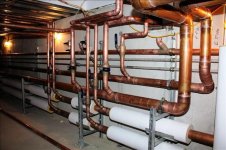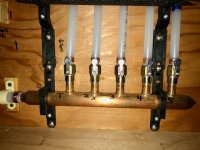hdv said:
A serious question: why do people hate soldering so much? I am not trying to be obtuse here. What am I missing? I've always much preferred soldering over the other available solutions. But reading all these messages makes me wonder if I might be wrong about it. Why do you guys think the alternatives are better? About the only reason I can think of is when using flexible pipes not made of metal. But other than that?
Bob D. said:
On soldering I don't know the answer. I have always found it easy and reliable. And when you're done it looks good too. I am not a plumber but I have soldered copper tube and pipe from 8" on down to 1/8", most of it for control air used in industrial settings and medical gas systems in hospitals. I know I have done over 100 joints a day many times on various jobs.
It's not the easiest to take apart if changes are needed but it can be done and the fittings are usually reusable which is good considering their cost today. Which is probably one of the biggest complaints, the cost of a copper system will be much higher than most others, and it takes longer to install. Another factor is what is the process fluid, copper is not always the best material to use. Plus you have to be good at soldering. If you're not and have a lot of leaks (even one a day) then you'll hate it. But with the right tools and technique not a problem.
Svar said:
hdv said:
A serious question: why do people hate soldering so much? I am not trying to be obtuse here. What am I missing?
Whenever I do it it always happens in super confined space with plenty of flammable material around. [sad]
I've done repairs with pipes still dripping because water could not be shut off completely. Try that with soldering.
Also, PEX is very forgiving with turns and various adjustments.
HarveyWildes said:
Alex said:
...
All this plastic stuff is fine when you're doing a new install, but wait till you'll have to repair something or change a coupling. Then you're not so happy anymore. I severely dislike these plastic pipes.
I had pex put in a new house 13 years ago. I've had no problems with the pipe material, but two plumbing issues that required repairs:
- About three years ago I punched a hole in the middle of a pex pipe with a nail gun while finishing the basement. Time to fix - ~5 minutes, but they still charged me for the travel. Served me right. Quality of fix, perfect so far.
- I had a hose spigot go bad last year. Time to fix the copper fitting at the spigot - ~30 minutes to detach the copper elbow from the spigot and reattach it to the new spigot - in all fairness, part of that was deciding what to do. About 5 minutes to reattach the copper elbow to the pex. Quality of overall fix, perfect so far.
So I can't fault the quality of pex or the ease of repair at this point.
On the other hand, I had non-pex plastic in a 1979 mobile home a while back that was terrible. The constant expansion and contraction of the aluminum crimping rings on hot water pipes caused several joints to fail 2-3 years after the manufacturing date, with some water damage each time.
I'm not sure how many copper options there are, but there are a bunch of plastic options, and clearly some are better than others. I've had good luck with the pex tubing that my plumber used, but I'd also recommend that you do your homework on plastic if you choose to use it. I also have to admit that I would feel better about pex if someone was able to say that they had a 50 year old house with pex that was trouble free. But so far, at least, my experience has been that the pex itself is trouble free

.
Please excuse the full quotes, but I'd like my answer to be read in full context.
Let me give a bit of a back story here:
When we had new pipes installed for the master bathroom, guest bathroom, kitchen and backyard we got multiple quotes. None of the quotes included soldered copper pipes. Copper pipes, yes, but also crimped. The piping for flow and return that connect to the furnace/heating are crimped copper as well.
The plumber we went with had offered the composite pipes (Fraenkische Alpex F50 Profi) and we never questioned that.
What they say about the composite pipes is that they are incredible smooth on the inside, so chalk doesn't stand a chance to accumulate/"grow" inside these - plus they are entirely non-reactive to other materials. Given that there were still steel/zinc pipes, and even some copper/red brass/red bronze type fittings within the line this was said to be a good solution.
Now up until a year ago, we had zero trouble with this installation. Now you might remember that I had some serious issues with some high-end faucets - but not with the composite installation itself. A year ago, we started noticing that water pressure would drop immensely if two faucets were open(ed) at the same time. Especially noticeable while washing your hands after having used the restroom. The tank fills and once it is full, you get noticeably more water from the faucet.
When I changed the faucets in the laundry room, I noticed how small the actual diameters of the piping and connectors is. With the much bigger steel/zinc pipes being feed by such small lines I suddenly understood (part) of the problem. But I always wondered why it would happen only after years of unquestionable behavior of the installation. (I hope to find an answer, once the feeding lines are upgraded to bigger diameters.)
Besides that, and this per my new plumber is a dimensioning/design problem i.e. not a problem of the composite pipes per se, I have nothing bad to say about the composite installation. And also the connected copper (crimped) installation leading into the backyard and to the "driveway"/ front of the house are trouble free.
So that said, we never had a soldered copper installation offered in first place.
Hate is such a harsh word, I can't, and I would never say I hate soldered copper pipes. But I have seen enough botched jobs to understand why there might be a certain dislike among people/customers and trades people/ plumbers/hvac techs.
Looking at Bob's picture, thats simply beautiful and if you can get such a result, every time, it's indeed nothing left to wish for.
I think the main factors are:
- cost/time efficiency, as it's highly economical
- if crimped/ installed as instructed you get a sealed connection every time. No after thoughts, and there is almost no learning curve. Do it once or twice and you know how to do it. (Proper tooling assumed) It's something even the youngest apprentice on the crew can get right in no time.
- I personally know someone who had to quit/cancel his apprenticeship because he got allergic reactions to the soldering fumes and it is (was?) still required when taking the final, practical exam/test. He literally had to throw away almost 3 years of his life because of this.
- It's marketed very well. I have been to trade shows, and tried the different systems out of curiosity - one thing all of the manufacturers have in common, they market this as the meets end-all perfect solution. And of course, they "love" this because it's highly proprietary, you can't mix connectors and have to buy adaptors/specialized connectors if you want to pass over to a different type system. Not to forget the specialized tooling, and then all of the dies. (Each diameter has it's own die, and then every system has it's own dies.)
Coming back to soldering, I think the main issue is that not everyone gets it done as fantastic as Bob does, judging by the picture. I have seen so many pipes messed up/ covered with runs of solder, solder coming out of the connectors and the like. I guess, if you are one of the guys that "get it" and who like doing it getting great to fantastic results - you won't have much reasons to change over to composite pipes or crimping in general. But I guess many people consider it heaven sent, not ever having to touch the soldering iron again if they can help it.
So really, no "hate" here.

Oh, and there's another system. In German it's called "Klemmring". It's a screwed down clamp connection for aluminum-composite pipes. And of course "Schneidring" -> cutting ring. Found on small diameter copper pipes.
Kind regards,
Oliver



